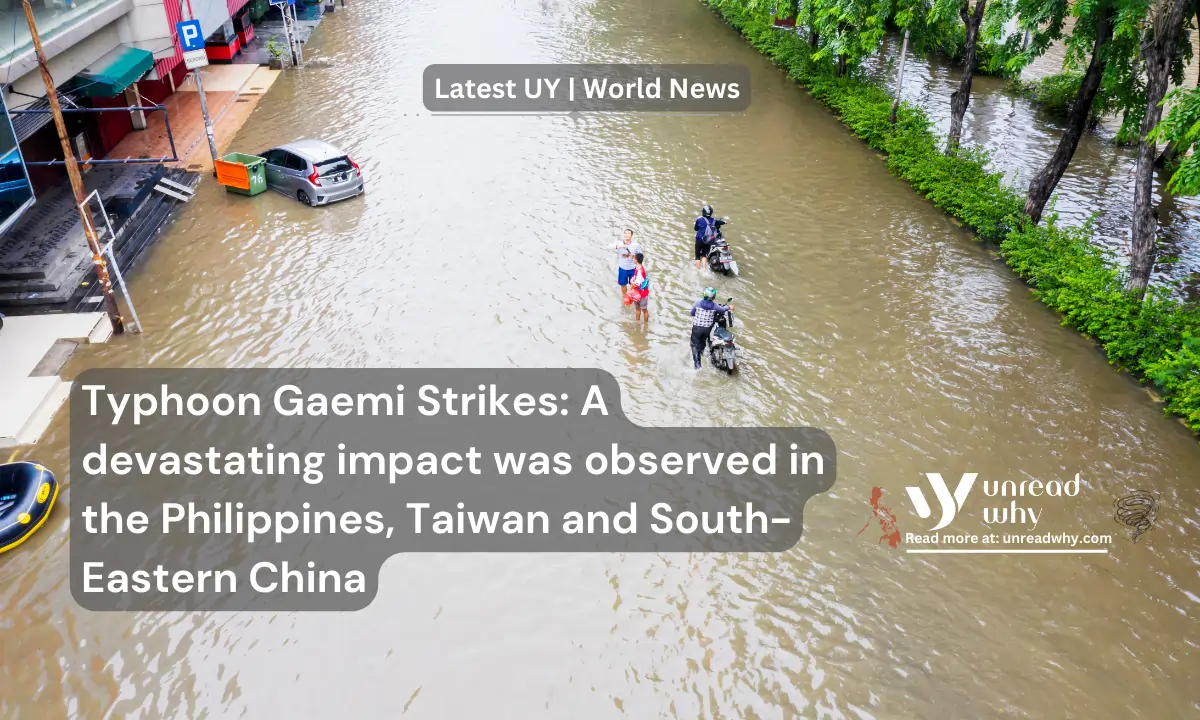Typhoon Gaemi
Typhoon Gaemi was popularly known as Super Typhoon Carina in the Philippines. In July 2024, this tropical cyclone hit East China after affecting Taiwan and the Philippines. On July 19, for tropical depression in the east of Palau, Gamie, was formed. For this effect, it created favourable environmental conditions to intensify the speed of the cyclone and it reached its peak around 165 km/h and in its centre with an atmospheric pressure of 940 hPa. However, the cyclone is classified as a Category 4-equivalent typhoon. Japan’s metrological agency provided the name Gaemi; on the other hand, Carina was provided by the Philippines weather service.
Effect of Gaemi
Typhoon Gaemi’s severe storm and rainfall was considered as strongest hit in Taiwan in the last eight years. For this effect, it was noted that it dropped more than 66 inches of rainfall in Taiwan. Along with extreme weather conditions, flooding was observed in the Philippines. It was further noted that for this extreme flooding, more than 20 people were killed.
Gaemi’s effect on Taiwan
Extreme rainfall hit the mountains of Taiwan with Typhoon Gaemi. Duonalindao, a city of Taiwan, for three days of continuous rain, were flooded with 66.16 inches of rain, and at Weiliaoshan, it was reported as 58.05 inches. For this extreme environmental condition the financial market, schools and government offices were closed on 25th July. As per the report of the fire agency of this country reported that a cargo ship carrying 9 people who were sank in the sea which was 20 miles off the coast.
Massive oil spill in Philippines
Typhoon Gaemi carries monsoon rain, which strikes the Philippines. As per the coastguard of the Philippines, it was “racing against time”. Containing oil spills was the biggest risk for the country. The cyclone causes significant disruption in the different regions of Taiwan, the Philippines and southeast China. However, among those, the major incident was observed that MT Terra Nova, which was a Philippine-flagged tanker carrying around 1.4 million litres of oil, capsized in Manila Bay.
For the powerful winds or rough sea conditions, the tanker which carries oil was overturned, and the oil spill happened. As per the report of the Philippine coastguard oil slick extending around 4 kilometres. However, efforts to clean the oil were ongoing. However, high waves which were caused by Typhoon Gaemi make the process more challenging. These spills can have both immediate and long-term consequences for ecosystems and human communities.
Typhoon moving to China.
On Thursday, it was reported that Typhoon Gaemi was moving to China. The storm Gaemi was considered a Category 1 hurricane. This storm entered on Thursday evening in the Fujian province of China with continuous flooding or rain. Through this flooding, extreme effect was observed in China’s different provinces. On this background, it was noted that on July 27 hundreds of chemical or mining companies were closed in Liaoning province of this city. However, 30000 people were safely relocated to safe locations.
Additionally, it was observed that from 25th July, 40 trains were suspended for safety reasons as continuous rain caused damage to the tracks. Through this suspension, the government aim to avoid any hazards. In the Hunan province, it was reported that within 24 hours it recorded 30 cm of rain. Yuelin, a village which was under Hunan province, reported that after 8 am, for mudslide struck 21 people were trapped in the homestay. Additionally, it was further reported that in the southeastern China region, fifteen people were killed in a mudslide on 28th July.
Along with this, it was further reported that for the storm-related wind, a tree fell in Shanghai, which caused the death of a delivery person. Along with this, the government shifted around 150,000 people who were living in Fujuan in southeastern China for safety concerns.


